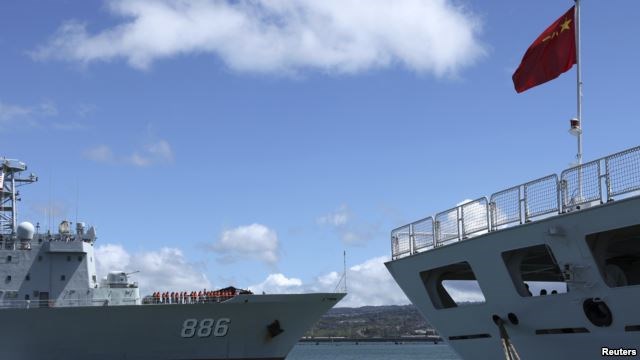
Tuesday December 8, 2015
By Jill Craig, Shannon Van Sant

A Chinese People's Liberation Army (PLA) Navy replenishment ship (L) sails past a PLA Navy hospital ship in a June 24, 2014, photo.
NAIROBI, BEIJING— China plans to build its first overseas military outpost in the east African nation of Djibouti, a move analysts say is part of a broader global economic strategy and reflects deepening ties with Africa.China says the naval base in Djibouti will be a logistics and supply center. It is China’s first overseas military installation.
The United States, France and Japan also have bases in Djibouti. The small East African country is close to African hot spots like Somalia and the Sahel and sits on the Gulf of Aden, along a key global trade route linking the Red Sea to the Indian Ocean.
Peking University professor of international relations Wang Dong said the facility will be instrumental in protecting Beijing’s key shipping routes.
"It's not really a quote unquote military base, it is more for access and supplies. Because China is conducting a lot of piracy missions in the Gulf of Aden for many years, and there is a logistic need for resupply," Wang said.China deployed U.N. peacekeeping troops to South Sudan this year and has contributed ships to anti-piracy patrols in the Gulf of Aden since 2008. But the country’s foreign policy has long been based on non-interference in other countries' internal affairs.
Part of experiment
Head of the Africa program at the London-based Chatham House, Alex Vines, said the Chinese are experimenting with this new base.
“They still want to clearly emphasize that China is different from other powers in Africa, so it’s not like France, that has military bases in various places, or the U.S. that has a military base at Camp Lemonnier, so they’re framing this as just a naval facility. In effect, though, this is about Chinese experimentation, longer term, how will African governments react?” Vines said.
Alexander Neil, a senior fellow at the Institute for Strategic Studies Asia office in Singapore, said the Chinese are enlarging their footprint in Africa in other ways as well, a foreign trade and investment strategy known as “one belt, one road." It refers to setting land and maritime trade routes, a kind of modern-day version of the historical Silk Road.
"So I think the big shift has been emulating what we've seen with the 'one belt, one road' project, which is to shift towards bringing China's excess capacity into Africa to build infrastructure, to provide soft loans, interest-free loans, and to stimulate business interests in Africa with Chinese partners, whereas China's approach previously was more extractive over the last decade,” Neil said.
Every three years, Beijing has doubled its financial support for Africa: from $5 billion in 2006 to $10 billion in 2009 and then to $20 billion in 2012.
Now, China has tripled that number. President Xi Jinping was in South Africa last week where he pledged $60 billion in loans and aid to Africa.
That followed announcements of $156 million in emergency food aid for drought-afflicted nations, and a further $60 million for an African Union military rapid-response force.